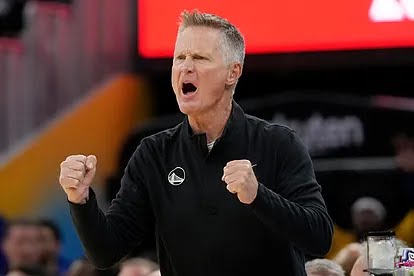
With Stephen Curry Injured, Steve Kerr’s Bold Decision Could Divide Warriors Locker Room
When Stephen Curry limped off the court, an unmistakable wave of concern rippled through the Golden State Warriors’ fanbase and locker room alike. Curry has long been the heart and soul of this Warriors team, carrying the franchise through thick and thin, especially as they navigate their post-dynasty identity. His absence raises immediate questions: who will step up, and how will head coach Steve Kerr guide his team through this turbulent period? Kerr’s decisions in the coming days will set the tone for the Warriors’ season—and could risk dividing a locker room that’s used to rallying behind its superstar.
Steve Kerr’s recent choice to elevate young talent and adjust the Warriors’ offensive schemes has raised eyebrows and stirred debate among fans and analysts alike. Kerr’s reported plan to focus more on rising stars like Moses Moody and Jonathan Kuminga, while giving them increased playing time and responsibility, represents a bold departure from the team’s tried-and-tested approach. On one hand, investing in younger players seems pragmatic—developing a new generation of stars to keep the Warriors competitive in the long term. But on the other, Kerr’s approach may alienate seasoned veterans and players accustomed to a more Curry-centered game plan.
Why Kerr’s Gamble Could Backfire
For years, the Warriors have been synonymous with a “strength in numbers” mentality, a rallying cry that embodies the team’s depth and selflessness. However, this camaraderie has often been predicated on Curry’s presence as the undisputed leader. With Curry sidelined, there’s now an inevitable power vacuum on the court. Kerr’s decision to shift focus to younger players could disrupt the locker room’s delicate balance, especially if it means sidelining players who have been essential in supporting Curry’s style.
Players like Draymond Green and Klay Thompson, franchise cornerstones who have carried the Warriors through multiple championships, may not be as willing to take a backseat to less experienced teammates. Green, known for his vocal leadership and competitive spirit, might clash with Kerr’s vision if he feels the new approach is weakening the Warriors’ chances to contend now. Meanwhile, Thompson, who’s worked tirelessly to return to form post-injury, could feel slighted by any indication that the team’s focus is shifting away from its veteran core.
Can the Warriors Afford a Divided Locker Room?
For a team like the Warriors, chemistry isn’t just an asset—it’s their edge. Golden State’s dynasty was built on a foundation of trust, with each player buying into the philosophy of sacrifice for the greater good. Kerr’s potential pivot to a more experimental approach threatens that cohesion. Veterans accustomed to Curry’s ball-handling, off-ball movement, and instant scoring threat might feel frustrated by adjustments to the offensive schemes, particularly if the new system fails to yield immediate success.
Furthermore, the decision to elevate younger players could create a divide between those who see themselves as part of the future and those who view their role in more short-term, championship-focused terms. The veterans who sacrificed their personal stats for the team’s glory may question the value of an approach that prioritizes development over immediate results.
Is Kerr Right to Prioritize the Future Over the Present?
In a franchise driven by a winning culture, Steve Kerr’s decision could be seen as a gamble on the Warriors’ future. With Curry’s injury, he might argue that a focus on younger players could protect the team in the long run, possibly creating the next generation of stars in Moody, Kuminga, and perhaps others. Kerr’s willingness to invest in potential is consistent with his reputation for nurturing talent and giving his bench valuable experience in meaningful minutes.
But many fans, and potentially even players, could feel betrayed by an approach that seems to concede the season to development. Warriors fans, conditioned to expect contention, may balk at the idea of treating any season as a rebuilding year, especially with players like Green and Thompson still in the mix. Kerr’s decision, though forward-thinking, risks alienating loyal fans—and creating a schism in the locker room between those aligned with Curry’s present-day Warriors and those thinking about tomorrow’s team.
The Road Ahead: Can Kerr Keep the Locker Room United?
To navigate this situation successfully, Kerr will need to balance the interests of all players—seasoned and unseasoned alike. Effective communication and transparent intentions will be crucial in ensuring that the team sees the vision as a collective journey rather than a divisive strategy. Green and Thompson will need to buy into a system that may not immediately seem like the best way to win a championship but promises growth for the future.
Whether or not Kerr’s gamble pays off, the decision underscores a central challenge facing the Warriors: transitioning from an era defined by Curry’s brilliance to one that doesn’t rely on a single superstar. Kerr is betting that the team can adapt, learn, and ultimately emerge stronger from this moment. But if he fails to manage the conflicting priorities within the locker room, his decision could unravel the very foundation of Warriors culture, splitting a team that’s thrived on unity.
As the season unfolds, all eyes will be on Kerr. How he handles Curry’s absence and the delicate balancing act within the Warriors’ locker room could determine not just the fate of this season, but the long-term trajectory of a franchise that’s always prided itself on being a family. And as with any family, there’s a risk that bold choices, even with the best intentions,can lead to painful divisions.






